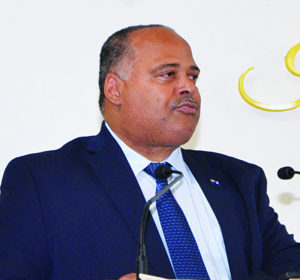
In the weekly Press Conference on last Monday, 6th February, Premier Ellis L. Webster sought to allay fears and suspicions of the public. He made it clear that in order to be in a position to receive the recently confirmed 12 million pounds from the UK Government for the Anguilla Resilience programme, Anguilla must meet certain conditions, yes, but there is no need to give up or, as it were, to sacrifice anything in exchange.
“There are social media statements out there,” he said, “that are going around saying we have given up a lot to get this assurance of the monies that will be earmaked for the airport development.
He referred to the Minister of State for Overseas Territories, Mr. Zac Goldsmith, with regard to the Anguilla Economic Resilience Programme (ARP). He said that former Minister Amanda Milling had initially mentioned that under this programme Anguilla would receive 4 million pounds, then 4 million pounds a year for two more consecutive years. But this was not confirmed – it was more like a promise.
“Given the recent changes in the UK administration,” the Premier noted, “we wanted to get an assurance that these monies would indeed be available for the airport development which is the number one priority for economic resilience.
“And so, Lord Goldsmith did publicly confirm that this funding would be available. He made that assurance to us during his recent visit here”.
But, realising that people are inquisitively asking what had been given up in exchange for the 12 million pounds, the Premier was quick to insist that nothing has been “given up”, but that Anguilla must meet some reasonable conditions:
“Basically, every time we get funding it comes with conditions,” he noted. “We know that was the case with the EC$100 million that was given as financial aid tied to COVID-19 relief. Now with the ARP, there are conditions to be met as well.
“These conditions state: to ensure that quarterly reports must be produced by the statutory bodies, and that they must reduce their arrears; to ensure that statutory bodies’ budgets must be approved by Executive Council and laid before the House of Assembly.
“These are things that should have been already done,” he reflected. “For the administering power of the UK to come and insist that we must do these things, we should be sensitive enough to realise that these practices should have been existing all along.
“Other conditions stipulated for receiving the funds under the ARP are that there must be consideration of the recommendations laid out by the actuary regarding the Public Service Pension Fund and the Anguilla Social Security Fund. As we have heard from the actuary’s report, these two funds are in jeopardy and are at risk of being depleted, potentially – the Public Service Pension Fund by 2028 and the Anguilla Social Security Fund by 2038.”
The Premier stressed that steps need to be taken to ensure that these funds are sustainable. “We want to make sure that when persons retire from the public service that these funds are there for them to benefit from after they would have paid into them during their employment,” he emphasised.
“These are the conditions that we must meet for our own benefit. We are not ‘giving up’ anything to receive the ARP funding other than what we should have been doing all along,” the Premier stated.








